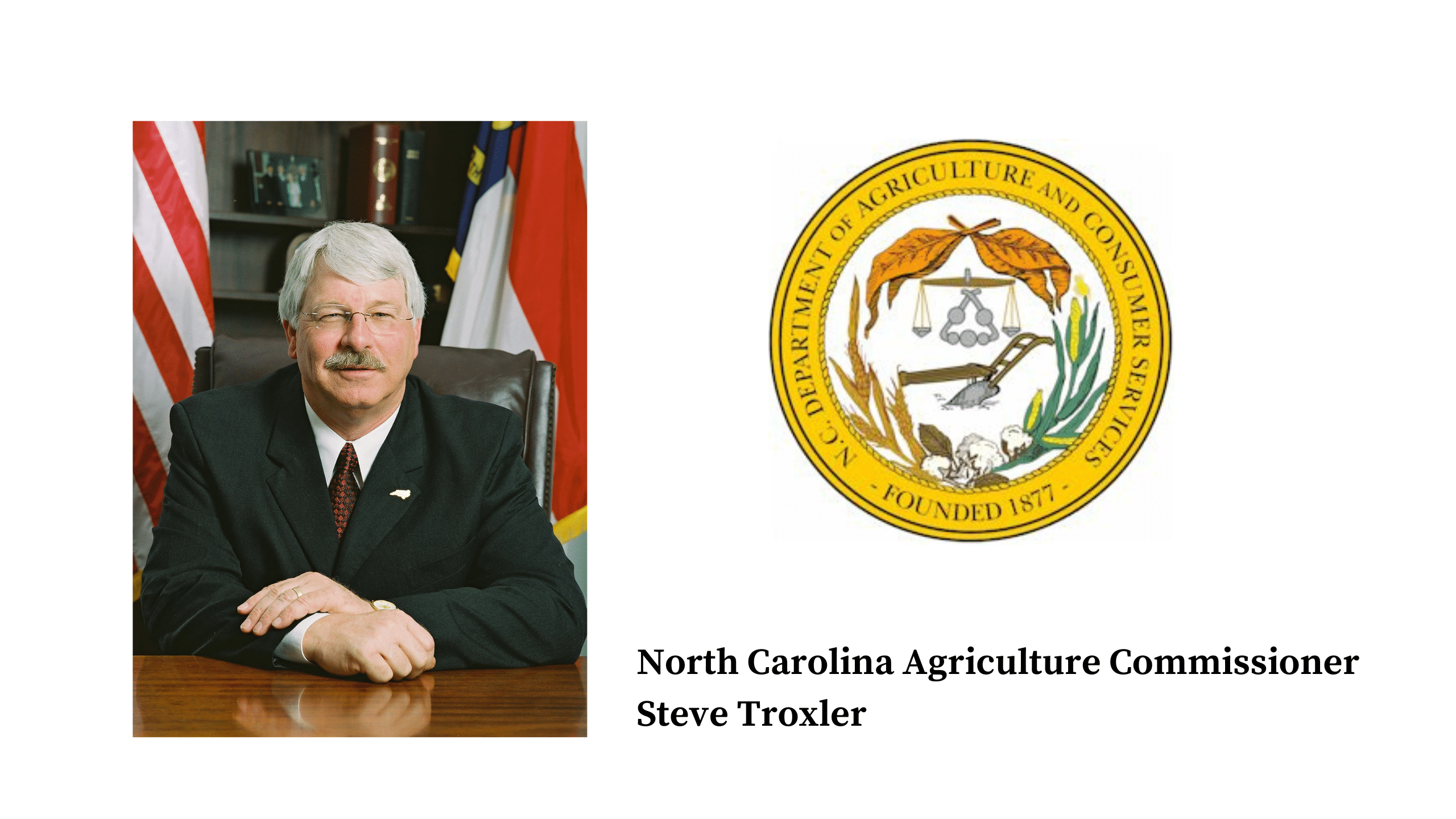
March 9, 2023
Critical Conversations with Golden LEAF President, Chief Executive Officer Scott T. Hamilton featuring North Carolina Agriculture Commissioner Steve Troxler
March 9, 2023
Recently, Golden LEAF President, Chief Executive Officer Scott T. Hamilton sat down with the North Carolina Agriculture Commissioner Steve Troxler via Zoom and filmed an episode of Critical Conversations. In this series, Scott talks with professionals about economic development issues affecting the state.
Commissioner Troxler leads the N.C. Department of Agriculture and Consumer Services, consisting of 20 divisions and more than 2,000 employees. Since taking office in 2005, Troxler has focused on developing new markets for N.C. farm products, preserving working farms and protecting the state’s food supply.
Commissioner Troxler was raised in Guilford County and has spent his entire career in agriculture as founder, owner, and operator of Troxler Farms. Over the years, the family-owned farm has produced tobacco, wheat, vegetables and soybeans.
The North Carolina Department of Agriculture and Consumer Services’ mission is to provide all North Carolina residents with diagnostic and advisory services that increase agricultural productivity, promote responsible land management and safeguard environmental quality.
Commissioner Troxler has a goal to make agriculture and agribusiness a $100 billion industry in North Carolina. Commissioner Troxler said that statistics on North Carolina’s economic impact is behind by about a year. He stated that according to the current available statistics, agriculture in North Carolina is up about $97 billion. He said that when the 2022 statistics come out, he thinks our state’s agriculture industry will meet or surpass the $100 billion goal. Commissioner Troxler added that North Carolina has strong production numbers, good commodity prices, and the suppliers are doing well.
One of the strengths in North Carolina’s agriculture and agribusiness is its diversity. Commissioner Troxler stated that North Carolina ranks in the top five in the nation in several areas. He said the state is number one in flue-cured tobacco, number two Christmas trees, and number two in hogs. Commissioner Troxler also said that North Carolina is number one in all poultry receipts, which means in all the areas of poultry. Fresh market blueberries and strawberries are also in the top 5 in the nation. Commissioner Troxler added that the state has gone from selling mostly just raw commodities to selling commodities processed, so they are ready to heat and eat.
Commissioner Troxler credits the support of several strong partners. He credited the partnerships of the Golden LEAF Foundation, commodity groups, farm groups,and the university system. He stated that these partners are all working together which is not a given and is a special strength of North Carolina. He added that agriculture policy will be the deciding factor for agriculture success or failure long term. Commissioner Troxler explained that North Carolina has to maintain good agricultural policy at all levels: local, state, federal levels. He credited the legislature for its partnership with the industry. He said we have to make sure that policy allows agriculture to be sustainable and profitable.
Although there are so many strengths to the industry, one of the challenges is the available workforce. Commissioner Troxler said that approximately 668,000 people are employed in North Carolina agriculture and agribusiness. One challenge, Commissioner Troxler said, is that universities cannot graduate enough people with expertise in the agriculture industry to fill the jobs available. He explained that university partners like North Carolina State University, North Carolina Agricultural and Technical University, and the University of Mount Olive are working hard to get people interested in agriculture and graduated with agriculture and agribusiness degrees. Commissioner Troxler has even taught classes at universities to those undecided students that agriculture is a viable path. He added that the state employs one of most every discipline in agriculture. Commissioner Troxler emphasized that the main thing that gets young people to work at a farm is profit. He said, we have to make sure that farms are profitable. With generational changes in farming, it is difficult to do that without additional businesses and diversification.
Another challenge the agriculture industry is facing is the amount of available farmland, said Commissioner Troxler. He stated that the number one thing to help farmers stay in farming is for them to stay profitable, so when a real estate agent comes by, they don’t sell their land. Another solution to the issue of available farmland is the Farmland Preservation Trust Fund. He stated that the Trust Fund has helped protect 30,000 acres of farmland with permanent easement. Commissioner Troxler explained that the Trust Fund takes the current value of farmland as a farm and the value of the land for its highest and best use. Then, the difference in the two appraisals is offered as a permanent easement. The land can never be developed and always has to be farmed, said Commissioner Troxler. Farmers can sell their land but it has to be sold as farmland. Commissioner Troxler added that they are asking the legislature for $15 million recurring funds for the Farmland Preservation Trust Fund to reserve as much farmland as possible for the sustainability of agriculture.
To learn more about the North Carolina Department of Agriculture and Consumer Services, its priorities, and services offered, visit ncagr.gov.
Critical Conversations is a feature in the Golden LEAF newsletter every month. The next edition will be in our April 13th edition of LEAF Lines.